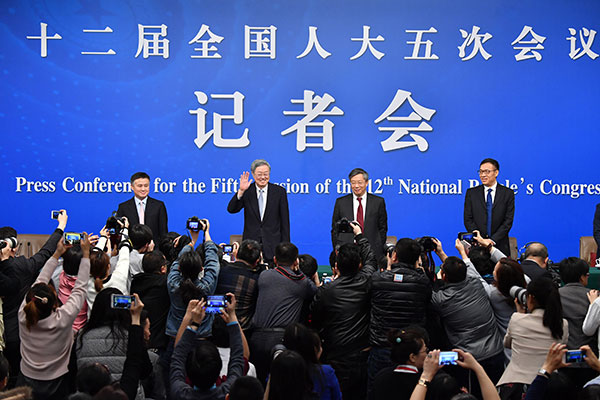
Zhou Xiaochuan, governor of the People’s Bank of China (PBOC), Yi Gang, deputy governor of the PBOC, Pan Gongsheng, deputy governor of the PBOC and director of the State Administration of Foreign Exchange, and Fan Yifei, deputy governor of the PBOC, greet the journalists at a press conference on financial reform and development for the fifth session of the 12th NPC in Beijing, capital of China, March 10, 2017. [Photo/Xinhua]
Yuan will stabilize
China’s central bank governor said the yuan’s exchange rate will naturally stabilize as the country’s strong economic fundamentals remain in place.
People’s Bank of China Governor Zhou Xiaochuan said on March 10 that the fluctuation in the forex market is quite normal and the market should not read too much into the changes.
Zhou said the central bank will enhance regulation of forex market in the future.
China to strengthen financial asset management
China could update the level of financial asset regulation if necessary to tackle “serious problems” in the country’s financial product market, People’s Bank of China Governor Zhou Xiaochuan said on March 10.
He said the major regulatory bodies overseeing the banking, securities and insurance sectors, the central bank and the foreign exchange administration, have reached a consensus on a way forward with detailed management policies to come out later.
The level of regulation may be further raised if necessary, Zhou said without elaborating on what that might involve.
China’s monetary stance to remain unchanged
China’s prudent and neutral monetary policy will remain unchanged as such a stance is conducive to the country’s structural reform, Zhou Xiaochuan, governor of the People’s Bank of China, said.
The central bank has many monetary policy tools available to it and the market should not read too much into its every move, he said.
“If the monetary stance is made more neutral while remaining prudent, it will benefit China’s structural reform, because if the stance is too loose, enterprises will not face pressure to reduce leverage,” he said.
He also said the problem of small enterprises facing difficulty getting financing will gradually ease. “Small enterprises have accounted for about one third of bank loans, much higher than before.”
Bond market will be opened further
China will continue to open up its bond market, senior officials with the central bank said on March 10.
Zhou Xiaochuan, central bank governor, said progress made in the last year, referring to the yuan’s inclusion into the International Monetary Fund’s special drawing rights basket, has attracted foreign investors into domestic bond market.
Pan Gongsheng, vice-governor of the central bank, said China would improve the tax system to support the opening-up of the bond market.
Deleveraging process can’t be rushed
The deleveraging process needs to be implemented steadily, senior officials with the central bank said on March 10.
Yi Gang, vice governor of the central bank, said the deleveraging process cannot be implemented at a fast pace in order to fend off financial risks.
“The first step is to control the leverage level,” Yi said.
Central bank governor Zhou Xiaochuan said the financial sector should refuse support for enterprises with high leverage ratios.
China plans tougher regulation of third-party payment platforms
China will strengthen regulation of third-party payment platforms as serious problems, such as lack of protection of customer privacy and misuse of customer funds, have been reported, said Fan Yifei, deputy governor of the People’s Bank of China, the central bank, on March 10.
China’s third-party payment industry has grown rapidly in recent years, with total transaction reaching 120 trillion yuan ($17.4 trillion) in 2016, up from 18 trillion yuan in 2013, Fan added.
Mortgage loans projected to record slower growth
After increasing at a fast pace last year, mortgage loans are expected to record slower growth, said Zhou Xiaochuan, governor of the People’s Bank of China, the country’s central bank, on March 10.
Extension of mortgage loans will help to reduce real estate stocks in lower-tier cities, but it may lead to price rises in major cities, Zhou said, adding that mortgage loans can boost growth of related industries. “We should adopt a relatively balanced policy (on mortgage loans),” he said.
Zhou said mortgage loans may continue to rise at a “relatively fast” pace, although it may moderately slow in the coming years.
China still backs foreign investment by domestic firms
China still supports normal investment in foreign markets by domestic enterprises, said Zhou Xiaochuan, central bank governor, on March 10.
But the country will control some “blind” investment or investment that have “dubious motives”.
Forex reserves adequate to maintain financial stability
The current $3 trillion foreign exchange reserves level is adequate for China to maintain financial stability, Zhou Xiaochuan, central bank governor, said on March 10.
Zhou said a decline in forex reserves is not a bad thing.
Yi Gang, vice-governor of the bank, said using forex reserves to stabilize the currency’s exchange rate does more good than harm.
China-US interest rate gap not big factor on yuan rate
The interest rate gap between China and the US will not necessarily have a major impact on the exchange rate of the yuan, said Zhou Xiaochuan, governor of the central bank, on March 10.
Interest rate gap is a factor that drives short-term international capital flows, but in the middle term, a country’s economic fundamentals, such as growth rate, investor confidence, and inflation level, determine the direction of cross-border capital flows, he told a news conference during the ongoing legislative and political advisory sessions.
He cited the case of Japan, which has ultra-low interest rates for years.
